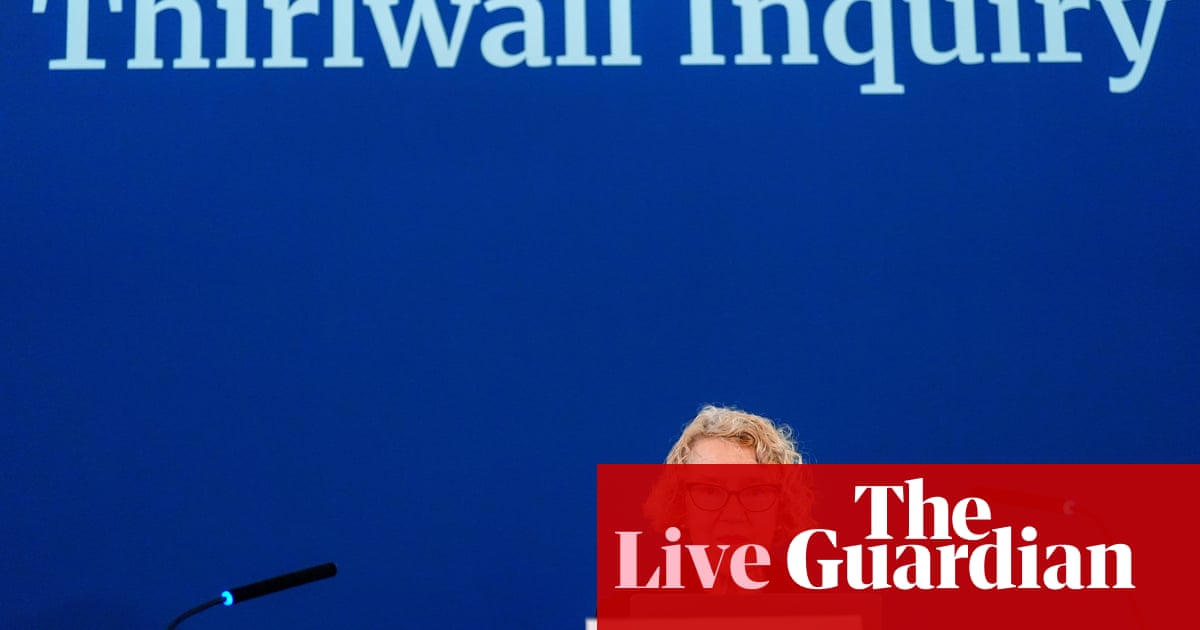Key events

Jamie Grierson
Speaking ahead of the hearing, Tamlin Bolton, a senior associate solicitor at Switalskis, which is representing families of the victims, said: âThe families that Switalskis represent have been through unimaginable heartbreak and distress. The facts and issues to be investigated in this inquiry are of deep concern to each individual family whose baby or babies were killed or attacked by Lucy Letby.
âTheir babies were born, harmed and died in 2015 and 2016 and they have already endured many years of anguish, yet this inquiry will be the first time that they will hear evidence as to how Letby was allowed to harm as many as 18 babies before she was removed from the neonatal unit at the Countess of Chester hospital.
âThe facts and issues in this inquiry should also be of profound concern to every family who has used or will use NHS maternity, neonatal or paediatric services and to the wider public who need to have confidence in patient safety. For the families we represent, that confidence has been shattered.â
Nine months ago, Lady Justice Thirlwall and the inquiry published her opening statement, which is available on video.
In it, she said:
We all know that there have been many inquiries into events in hospitals and other health care settings over the last thirty years. The case of Beverley Allitt who murdered babies at Grantham hospital in the 1990s comes to mind. Everyone was determined that it would not happen again. It has happened again. This is utterly unacceptable. I want to know what recommendations were made in all these inquiries, I want to know whether they were implemented? What difference did they make? Where does accountability lie for errors that are made?
No one can argue with the proposition that babies in neonatal units must be kept safe and well cared for. What is needed is the practical application of that proposition everywhere. In many units it will require profound changes in relationships and culture. This may not be easy to achieve but it is necessary and long overdue. The barriers to change must be identified if that hasnât been done already and those barriers must be removed. Where there is good practice, that must be shared. Bringing about necessary change will require the cooperation and will of all those who are involved in and who are responsible for the babies in our neonatal units â from the ward to the boardroom. The inquiry relies on that cooperation as we work on this profoundly important task.
The parents of the babies who were murdered or suffered injuries, some lifelong, live with the consequences every day. On top of their grievous loss they endured years of uncertainty about what had caused death or injury. And for some, uncertainty remains. All have made it plain to me that they want to do all they can to make sure that no one else suffers as they do. Iâve already mentioned one of the suggestions they have made as to how this may be achieved. With the help of the inquiry team and all those who will contribute to the inquiry I will do all I can to make sure that no one else suffers as they have. It is unconscionable that this situation would ever occur again.
A full transcript of the opening statement from November 2023 can be found here.

Felicity Lawrence
There have been some calls for the inquiry to be postponed or for its terms of reference to be changed. Felicity Lawrence reported this for the Guardian in August:
A group including some of the UKâs leading neonatal experts and professors of statistics is calling on the government to postpone or change the terms of a public inquiry over concerns about the conviction of the neonatal nurse Lucy Letby.
In a private letter to ministers, seen by the Guardian, the 24 experts said they were concerned that the inquiryâs narrow terms could prevent lessons being learned about âpossible negligent deaths that were presumed to be murdersâ in the neonatal ward of the Countess of Chester hospital (CoC).
Despite the convictions and court of appeal decision, there has been a small but growing number of experts raising concerns about the evidence presented at trial. Several came forward in an article published by the Guardian in July, expressing concerns that Letbyâs conviction was unsafe.
Read more here: Lucy Letby inquiry should be postponed or changed, experts say
Unlike other recent public inquiries, like that into the handling of the Covid pandemic or the Post Office Horizon IT scandal, the Thirlwall inquiry is not being streamed live to the public.
Core participants and limited sections of the media have been granted access. At a preliminary hearing for the inquiry in May lawyers for the families of the victims argued that the proceedings should be livestreamed to the public, in part to âcombat conspiracy theoriesâ. However, in a judgment later that month Lady Justice Thirlwall ruled against it.
Part of the reasoning given in the judgment was that there was a risk of court orders being breached during the proceedings. At the preliminary hearing, Rachel Langdale KC, counsel to the inquiry, said court orders that prevented the identification of a number of people involved, including all of the babies, had to be complied with.
Jamie Grierson and Josh Halliday have this explainer on the inquiry:
The Thirlwall inquiry has been set up to examine events at the Countess of Chester hospital and their implications after Lucy Letbyâs trial and subsequent convictions for murdering seven babies and attempting to kill seven more.
The three key areas being looked at by the inquiry are: the experiences of the victimsâ parents; the conduct of staff at the hospital with regard to Letby when she was employed at the hospital; and the effectiveness of NHS management.
The inquiry is chaired by Lady Justice Kathryn Thirlwall, a senior court of appeal judge. The counsel to the inquiry is Rachel Langdale KC. Formerly the leading counsel for a core participant in the Mid-Staffordshire NHS foundation trust public inquiry, she has also acted for local authorities and individuals in inquiries relating to safeguarding and children in care.
Among the core participants are the families of the children named on the indictment, who will be represented by legal teams. Others include the Royal College of Paediatrics and Child Health, the Department for Health and Social Care, the Countess of Chester hospital NHS foundation trust, the Nursing and Midwifery Council, the Care Quality Commission and NHS England.
The first week will see opening statements from the counsel to the Inquiry and from legal representatives on behalf of the core participants.
Welcome and opening summary â¦
Today at Liverpool town hall the Thirlwall inquiry will begin a week of hearing opening statements, as it seeks to examine how former nurse Lucy Letby was able to murder babies over a period of two years at the Countess of Chester hospitalâs neonatal unit.
Letby, 34, was sentenced to 15 whole-life orders after she was convicted of murdering seven babies and attempting to murder seven others across two separate trials.
The inquiry, chaired by Lady Justice Thirlwall, will consider the experiences of the parents of Letbyâs victims, look into the conduct of staff at the hospital and assess whether suspicions should have been raised earlier, whether Letby should have been suspended earlier and whether the police should have been brought in sooner.
The inquiry will examine wider NHS culture and consider the effectiveness of its management and governance structures. It is expected to last about four months, with a report to be released next year.
We will bring you updates from the opening day of the inquiry here.
